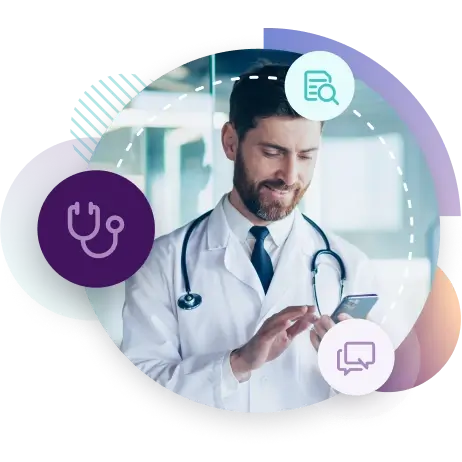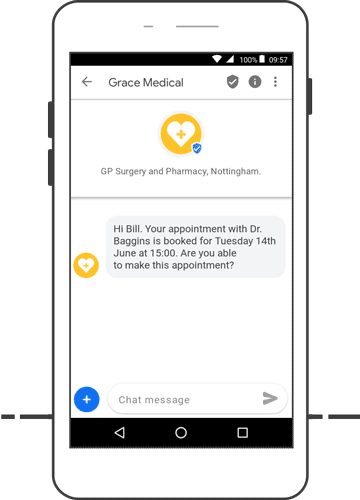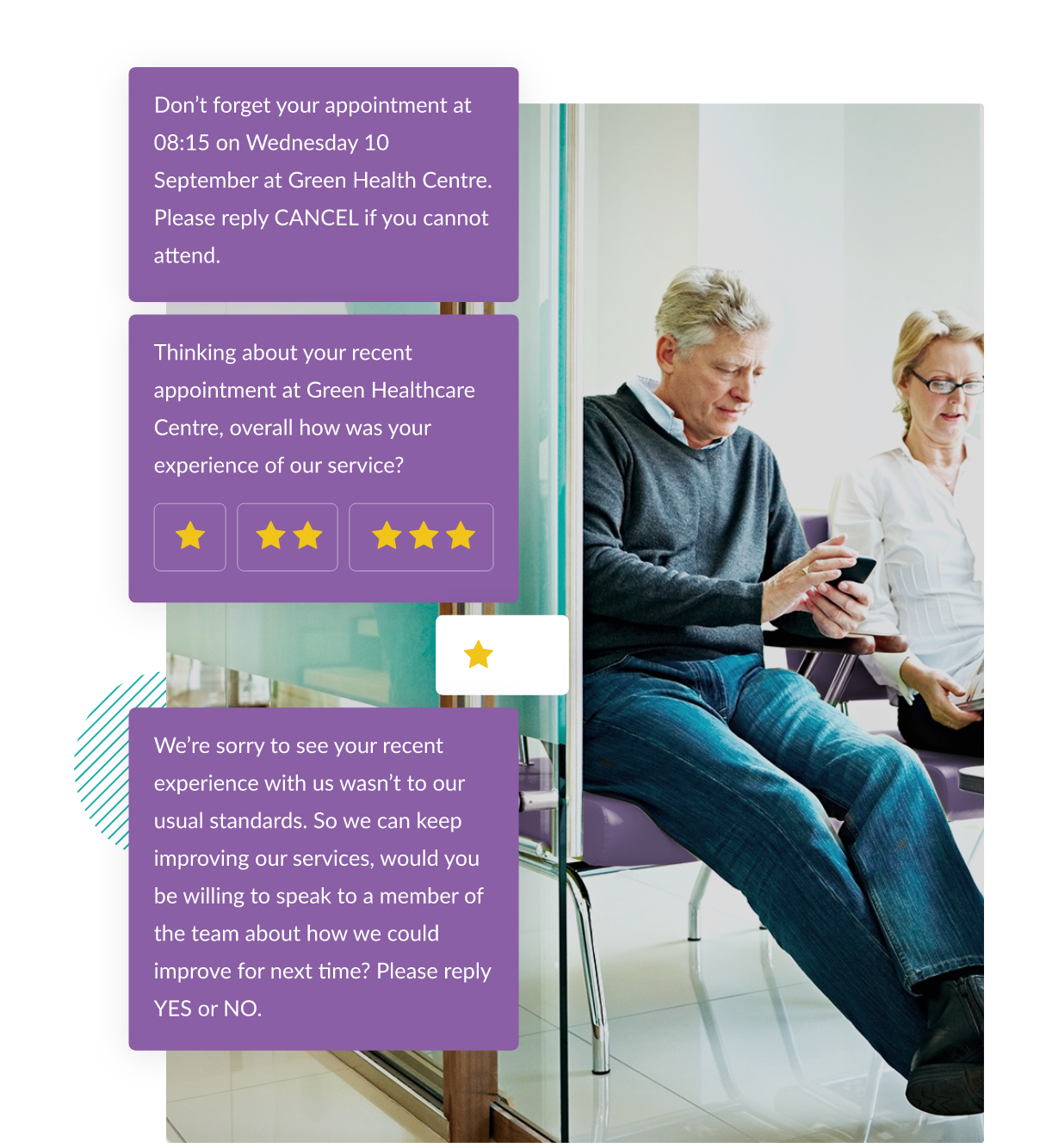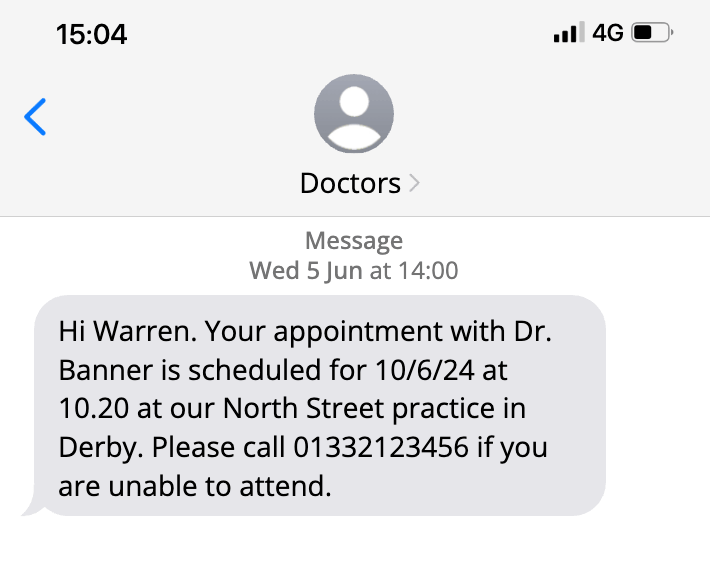INDUSTRIES
Healthcare messaging
Streamline patient communication with secure messaging solutions
From appointment reminders to test result updates and patient support, Esendex helps healthcare providers connect with patients at every stage. Reach your patients on their mobile devices, all from one secure and easy-to-use platform.

Deliver better experiences for your patients
£160
… is the cost of each missed hospital appointment to the NHS. Automated reminders help reduce these costs.
Source: NHS
61%
… of people would or have already opted in to receive appointment reminders and notifications via WhatsApp.
Source: Esendex
98%
… of all SMS messages are opened by the recipient, with an average response time of just 90 seconds.
Source: ReviewRefer
Clear and timely communication is essential for better patient outcomes. Esendex helps healthcare providers optimise their patient communication with a secure, reliable platform that ensures every message is delivered when it matters most.
Reliable delivery
Send appointment reminders and medical updates with confidence. Esendex ensures fast, secure delivery at scale, so your patients never miss important information.
Improve patient engagement
Increase patient response rates and satisfaction by delivering personalised, timely messages. Reach the right patients with messages that improve adherence and care.
Increase efficiency
Automate routine communications like appointment reminders and follow-up care to reduce administrative burdens. Free up your team to focus on providing exceptional patient care.
Let’s start sending, together.
Discover the full power of our mobile messaging platform.

Simplify appointment management with SMS, WhatsApp and RCS
SMS is ideal for sending appointment reminders and notifications that patients are sure to see. While interactive features on WhatsApp and RCS make it easy for patients to reschedule appointments directly through their messaging apps.
With Esendex’s multi-channel messaging solution, you can reach patients on the channels they prefer.
Improve patient outcomes with surveys and follow ups
Automate post-appointment follow-up messages to stay in touch with patients and continue their care. These messages can include reminders, surveys to collect feedback on their experience, or even tips for managing their condition.
This helps keep patients engaged, improves satisfaction, and provides valuable insights to your healthcare team.


Automate important reminders and updates to keep patients informed
Esendex makes it easy to automate personalised, easy-to-read messages directly to your patients, ensuring they never miss important updates.
Whether it’s a reminder that their prescription is ready for collection or a notification about test results, automated messages can improve patient outcomes by keeping them informed and engaged.
When it’s essential that a patient sees a message, SMS is one of the most reliable channels.
With open rates up to 98% and rapid delivery, it’s ideal for sending important messages like appointment reminders, prescription notifications, and lab test results.
Recipients don’t need to be connected to Wi-Fi to receive text messages, making it a dependable option for crucial updates.
WhatsApp offers an interactive and engaging way to connect with patients. With features like two-way messaging, appointment confirmations, prescription updates, and test result notifications can be sent directly through WhatsApp, making communication more personalised and efficient.
WhatsApp’s widespread usage, security features and user-friendly interface make it easy and safe for patients to engage without needing to download additional apps or remember login details.
With features like rich media, quick replies, and appointment rescheduling, RCS allows healthcare providers to send detailed messages with images, maps, or action buttons, making it easy for patients to interact directly within the messaging app.
Patients don’t need to download additional apps to receive and respond to RCS messages, making it an accessible choice.
Why healthcare organisations trust Esendex
Security and compliance
We’re ISO 27001 certified and fully GDPR compliant. From data protection to message delivery, security and deliverability is at the core of everything we do.
20+ years experience
We’ve been helping businesses send text messages to customers for over two decades. Our team brings in-depth knowledge and technical expertise to every solution we deliver.
5B+ messages per year
Our platform is built for high performance at scale. Every year, we deliver billions of SMS messages with the speed, security and reliability our customers rely on.

“We’re continuously looking for better ways to improve our customer experience, and the Esendex workflow has given us the information we need to be able to do that“
Ami Galbraith – Operations and Project Manager, HealthHarmonie
Insights
What happens after checkout? Improving the post-purchase experience
Business messagingWhat we’ll cover What is the post-purchase experience? Why does the post-purchase experience matter? Examples…Automation & AI Readiness Gap: Which UK sectors are falling behind?
TechnologyWhat we’ll cover The current state of automation and AI adoption in the…How conversational banking is reshaping customer experiences
Customer ServiceWhat we’ll cover What is conversational banking?Why is conversational banking on the rise?Real-world…



